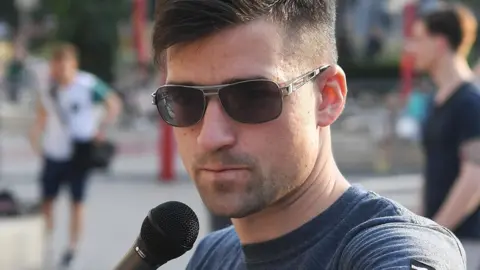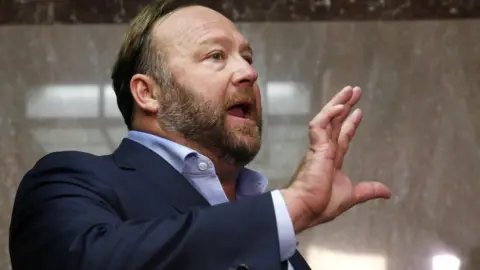YouTube restores far-right channels after appeal
 AFP
AFPThe channels of two prominent far-right YouTubers have been re-instated after the video-sharing site said it made a mistake in removing them.
Initially, YouTube gave no reason for changing its decision and just said it had made a "wrong call".
Later, it said that while many people found the channels "deeply offensive", they had not broken its rules.
The decision came days after YouTube's chief executive said YouTube had to be open to hosting "controversial" ideas.
Content clash
YouTube removed several channels and accounts this week, claiming they had broken its hate speech policies.
Among them was a channel run by white nationalist Martin Sellner and an anonymous British YouTuber known as The Iconoclast.
Mr Sellner was reportedly in contact with the man who allegedly carried out the Christchurch mosque shootings in March this year that killed 51 people. Austrian police are investigating his links to the attack. He denies any involvement in the shooting.
Mr Sellner is also banned from entering the UK, with authorities saying his presence would not be "conducive to the public good".
Both men protested about the closure of their YouTube channels on social media. They shared information sent to them from YouTube, which said they had "repeatedly" broken its guidelines.
On Thursday, YouTube reversed its decision and reinstated the two channels.
Several other far-right channels that YouTube banned this week remain unavailable.
An explanation for the change of heart came on Friday. Farshad Shadloo, YouTube's global product policy communications lead, said that after a "thorough review" it had decided that the channels had not broken its rules.
"We realise that many may find the viewpoints expressed in these channels deeply offensive," he said.
Mr Shadloo added that YouTube had recently updated the way it handled "hateful content".
This had led to it removing "thousands of accounts and tens of thousands of videos".
 Reuters
ReutersEarlier this week YouTube boss Susan Wojcicki wrote in a letter to video-makers that YouTube must remain an "open platform".
She said the desire to welcome all kinds of views had to be balanced against a "responsibility to protect the community".
"A commitment to openness is not easy. It sometimes means leaving up content that is outside the mainstream, controversial or even offensive," she said.
"Hearing a broad range of perspectives ultimately makes us a stronger and more informed society," she claimed.
On Thursday, a previously banned channel called the War Room returned to YouTube.
The War Room is a programme produced by right-wing conspiracy theorist Alex Jones' Infowars brand.
Infowars was removed from YouTube in 2018 for repeatedly breaking the site's rules on harassment and hate speech.
In a new video, the War Room quoted Ms Wojcicki's letter, suggesting it meant the Infowars ban was over.
But the War Room channel has since been closed by YouTube with no explanation.
